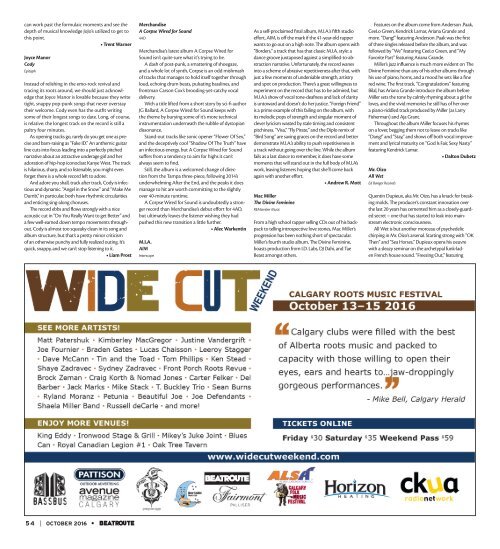BeatRoute Magazine Alberta print e-edition - October 2016
BeatRoute Magazine is a monthly arts and entertainment paper with a predominant focus on music – local, independent or otherwise. The paper started in June 2004 and continues to provide a healthy dose of perversity while exercising rock ‘n’ roll ethics.
BeatRoute Magazine is a monthly arts and entertainment paper with a predominant focus on music – local, independent or otherwise. The paper started in June 2004 and continues to provide a healthy dose of perversity while exercising rock ‘n’ roll ethics.
Create successful ePaper yourself
Turn your PDF publications into a flip-book with our unique Google optimized e-Paper software.
can work past the formulaic moments and see the<br />
depth of musical knowledge JoJo’s utilized to get to<br />
this point.<br />
• Trent Warner<br />
Joyce Manor<br />
Cody<br />
Epitaph<br />
Instead of relishing in the emo-rock revival and<br />
tracing its roots around, we should just acknowledge<br />
that Joyce Manor is lovable because they write<br />
tight, snappy pop-punk songs that never overstay<br />
their welcome. Cody even has the outfit writing<br />
some of their longest songs to date. Long, of course,<br />
is relative: the longest track on the record is still a<br />
paltry four minutes.<br />
As opening tracks go, rarely do you get one as precise<br />
and barn-raising as “Fake ID.” An anthemic guitar<br />
line cuts into focus leading into a perfectly pitched<br />
narrative about an attractive underage girl and her<br />
adoration of hip-hop iconoclast Kanye West. The track<br />
is hilarious, sharp, and so listenable, you might even<br />
forget there is a whole record left to adore.<br />
And adore you shall, track after track, Cody is infectious<br />
and dynamic. “Angel in the Snow” and “Make Me<br />
Dumb,” in particular, both have rhythmic circularities<br />
and enticing sing-along choruses.<br />
The record ebbs and flows strongly with a nice<br />
acoustic cut in “Do You Really Want to get Better” and<br />
a few well-earned down tempo movements throughout.<br />
Cody is almost too squeaky clean in its song and<br />
album structure, but that’s a pretty minor criticism<br />
of an otherwise punchy and fully realized outing. It’s<br />
quick, snappy, and we can’t stop listening to it.<br />
• Liam Prost<br />
Merchandise<br />
A Corpse Wired for Sound<br />
4AD<br />
Merchandise’s latest album A Corpse Wired for<br />
Sound isn’t quite sure what it’s trying to be.<br />
A dash of post-punk, a smattering of shoegaze,<br />
and a whole lot of synth, Corpse is an odd mishmash<br />
of tracks that manages to hold itself together through<br />
loud, echoing drum beats, pulsating basslines, and<br />
frontman Carson Cox’s brooding-yet-catchy vocal<br />
delivery.<br />
With a title lifted from a short story by sci-fi author<br />
JG Ballard, A Corpse Wired for Sound keeps with<br />
the theme by burying some of it’s more technical<br />
instrumentation underneath the rubble of dystopian<br />
dissonance.<br />
Stand-out tracks like sonic opener “Flower Of Sex,”<br />
and the deceptively cool “Shadow Of The Truth” have<br />
an infectious energy, but A Corpse Wired for Sound<br />
suffers from a tendency to aim for highs it can’t<br />
always seem to find.<br />
Still, the album is a welcomed change of direction<br />
from the Tampa three-piece, following 2014’s<br />
underwhelming After the End, and the peaks it does<br />
manage to hit are worth committing to the slightly<br />
over 40-minute runtime.<br />
A Corpse Wired for Sound is undoubtedly a stronger<br />
record than Merchandise’s debut effort for 4AD,<br />
but ultimately leaves the listener wishing they had<br />
pushed this new transition a little further.<br />
• Alec Warkentin<br />
M.I.A.<br />
AIM<br />
Interscope<br />
As a self-proclaimed final album, M.I.A.’s fifth studio<br />
effort, AIM, is off the mark if the 41-year-old rapper<br />
wants to go out on a high note. The album opens with<br />
“Borders,” a track that has that classic M.I.A. style: a<br />
dance groove juxtaposed against a simplified-to-abstraction<br />
narrative. Unfortunately, the record wanes<br />
into a scheme of abrasive repetitiveness after that, with<br />
just a few moments of undeniable strength, artistry<br />
and spot on production. There’s a great willingness to<br />
experiment on the record that has to be admired, but<br />
M.I.A.’s show of vocal tone-deafness and lack of clarity<br />
is untoward and doesn’t do her justice. “Foreign Friend”<br />
is a prime example of this failing on the album, with<br />
its melodic pops of strength and singular moment of<br />
clever lyricism wasted by stale timing and consistent<br />
pitchiness. “Visa,” “Fly Pirate,” and the Diplo remix of<br />
“Bird Song” are saving graces on the record and better<br />
demonstrate M.I.A.’s ability to push repetitiveness in<br />
a track without going over the line. While the album<br />
fails as a last dance to remember, it does have some<br />
moments that will stand out in the full body of M.I.A’s<br />
work, leaving listeners hoping that she’ll come back<br />
again with another effort.<br />
• Andrew R. Mott<br />
Mac Miller<br />
The Divine Feminine<br />
REMember Music<br />
From a high school rapper selling CDs out of his backpack<br />
to telling introspective love stories, Mac Miller’s<br />
progression has been nothing short of spectacular.<br />
Miller’s fourth studio album, The Divine Feminine,<br />
boasts production from I.D. Labs, DJ Dahi, and Tae<br />
Beast amongst others.<br />
Features on the album come from Anderson .Paak,<br />
CeeLo Green, Kendrick Lamar, Ariana Grande and<br />
more. “Dang!” featuring Anderson .Paak was the first<br />
of three singles released before the album, and was<br />
followed by “We” featuring CeeLo Green, and “My<br />
Favorite Part” featuring Ariana Grande.<br />
Miller’s jazz influence is much more evident on The<br />
Divine Feminine than any of his other albums through<br />
his use of piano, horns, and a mood he sets like a fine<br />
red wine. The first track, “Congratulations” featuring<br />
Bilal, has Ariana Grande introduce the album before<br />
Miller sets the tone by calmly rhyming about a girl he<br />
loves, and the vivid memories he still has of her over<br />
a piano-riddled track produced by Miller (as Larry<br />
Fisherman) and Aja Grant.<br />
Throughout the album Miller focuses his rhymes<br />
on a lover, begging them not to leave on tracks like<br />
“Dang!” and “Stay,” and shows off both vocal improvement<br />
and lyrical maturity on “God Is Fair, Sexy Nasty”<br />
featuring Kendrick Lamar.<br />
• Dalton Dubetz<br />
Mr. Oizo<br />
All Wet<br />
Ed Banger Records<br />
Quentin Dupieux, aka Mr. Oizo, has a knack for breaking<br />
molds. The producer’s constant innovation over<br />
the last 20 years has cemented him as a closely-guarded<br />
secret – one that has started to leak into mainstream<br />
electronic consciousness.<br />
All Wet is but another morceau of psychedelic<br />
chirping in Mr. Oizo’s arsenal. Starting strong with “OK<br />
Then” and “Sea Horses,” Dupieux opens his oeuvre<br />
with a sleazy seminar on the archetypal funk-laden<br />
French house sound. “Freezing Out,” featuring<br />
54 | OCTOBER <strong>2016</strong> • BEATROUTE


















